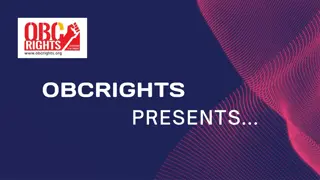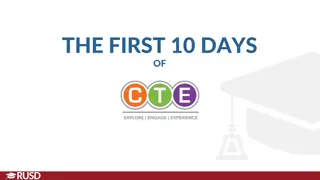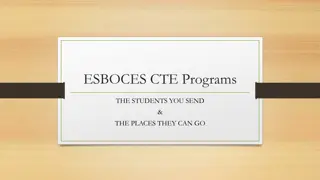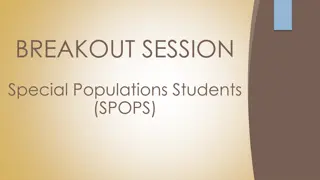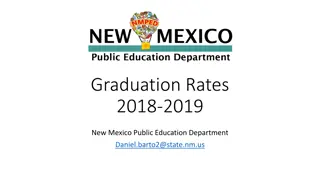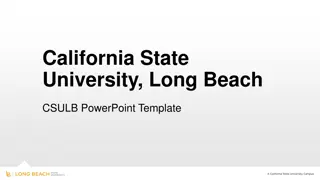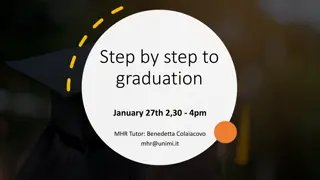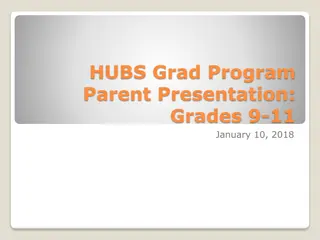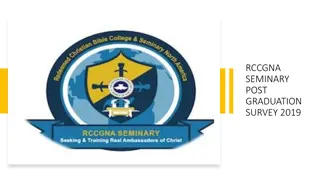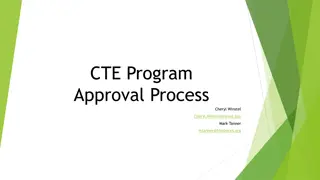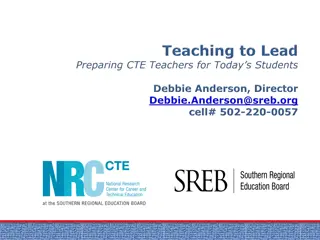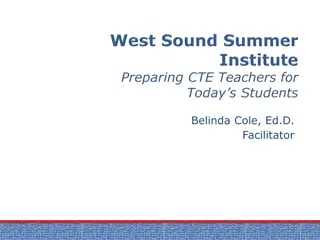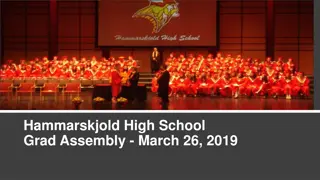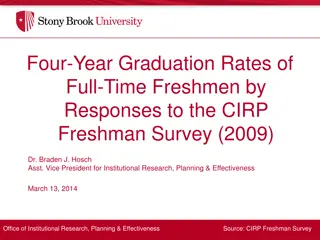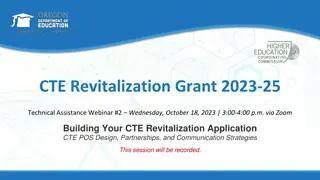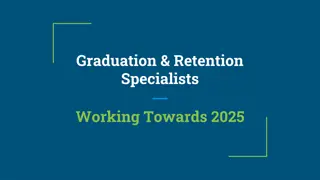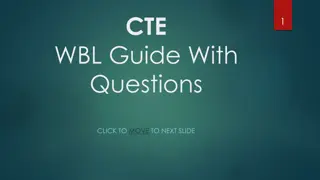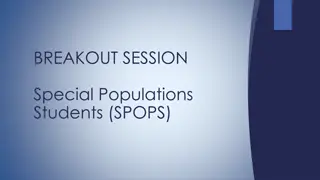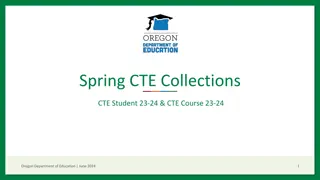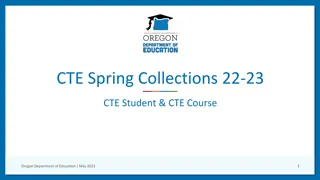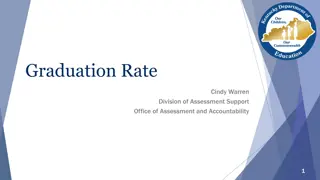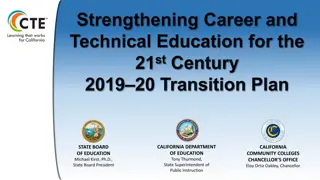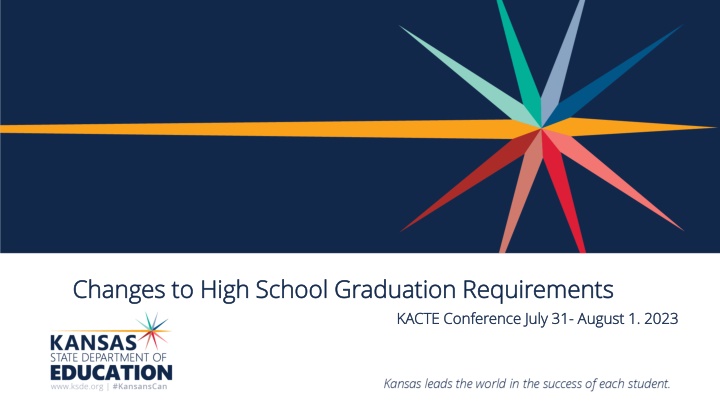
Revolutionizing High School Graduation Requirements and Postsecondary Pathways
Explore the innovative shifts in high school graduation requirements, focusing on mastery and competency-based credit awards. Discover how students can engage with diverse postsecondary assets aligned with their Individual Plan of Study, fostering a well-rounded educational experience. Stay updated on the evolving guidelines set forth by the Kansas State Department of Education, emphasizing flexibility and student-centered learning approaches.
Download Presentation

Please find below an Image/Link to download the presentation.
The content on the website is provided AS IS for your information and personal use only. It may not be sold, licensed, or shared on other websites without obtaining consent from the author. If you encounter any issues during the download, it is possible that the publisher has removed the file from their server.
You are allowed to download the files provided on this website for personal or commercial use, subject to the condition that they are used lawfully. All files are the property of their respective owners.
The content on the website is provided AS IS for your information and personal use only. It may not be sold, licensed, or shared on other websites without obtaining consent from the author.
E N D
Presentation Transcript
Changes to High School Graduation Requirements Changes to High School Graduation Requirements KACTE Conference July 31 KACTE Conference July 31- - August 1. 2023 August 1. 2023
New Graduation Credits BackStory Covid Navigating change The aha moment Task Force Nearly a year Class of 2028
Mastery and Competency Recommendation that KSDE shall: Define what constitutes the awarding of credit based on Mastery & Competency, using specific examples. Establish criteria for alternative avenues to credit attainment. Clarify the objective of IPS as part of high school graduation pathways. Provide assistance, structures and resources for students and families to improve education engagement which better meets the needs of ALL students.
Postsecondary assets Students will complete two or more two or more postsecondary assets from either of two categories, aligned with their Individual Plan of Study.
Postsecondary assets Career & Real-World Examples: CTE Scholar Eagle Scout or Gold Scout 4-H Kansas Key Award Two or more high school athletics/activities JROTC 90% attendance in high school Senior Exit Interview/Senior Projects Youth Apprenticeships 40 or more Community Service hours Client-centered Projects Workplace learning experience directly related to a student IPS Industry-Recognized Certifications Seal of Biliteracy
Postsecondary assets Academic Examples: ACT Composite (Score of 21 or higher) WorkKeys Level (Silver or higher) 9+ College hours State Assessment scores of 3 or 4 for Math, ELA, Science (demonstrating College Readiness) ASVAB per requirements of military branch selected SAT score (1200 or higher) Completing Board of Regents Curriculum International Baccalaureate Exam (4+) Advanced Placement Exam (3+)
Postsecondary assets Additional Information A list of approved assets will be kept by Kansas State Department of Education staff. Updated annually. Guidelines for changes will be forthcoming there will be a process for our partner districts to submit ideas. Districts can allow for additional post secondary assets but must have a minimum of two, like they do with high school graduation credits. Districts cannot restrict the list of post secondary assets. Further information on transcribing these assets will be forthcoming.
Course Classifications New system (class of 2028 and beyond) Communications (4) 3.5 - ELA (reading, writing, literature, technical) .5 - Communications (speech, debate, forensics, journalism, public speaking) Present system 4 units of English Language Arts Society & Humanities (4) 3.0 - Social studies (world, US, government) 1.0 - Fine Arts (music, dance, art, theater, etc.) 3 units of history & government 1 unit of fine arts
Course Classifications Present system: New system (class of 2028 and beyond) STEM (7) 3 - Math (Algebraic and Geometric concepts) 3 - Science (Physical, Biological, Earth/space) 1 - STEM Elective (Computer Science, Advanced Math, Advanced Science, Robotics, Advanced CTE, Advanced Technology, Agriculture, etc.) 3 units of science 3 units of math Employability & Life Skills (6) .5 - Physical Education .5 - Health .5 - Financial lLteracy 4.5 - Electives 1 unit of PE 6 units of electives
ELA/Communications New guidance is evolving, and a new course code may be introduced to have 0.5 ELA and 0.5 Communications class This new class should be announced by the end of the calendar year. Districts who already require a communications class along with the ELA requirements should be fine to continue that.
Financial Literacy Course Title: Course Title: Financial Literacy Course Code: Course Code: 22990 Course Description: Course Description: Financial literacy course provides students with an understanding of the concepts, principles and skills involved in making and applying sound financial decisions. This course emphasizes earning income, spending, saving, investing, managing credit and managing risk. Qualified Teachers: Qualified Teachers: Family and Consumer Sciences, Gen Business, Business Ed Comp, Business Economics, Business Finance, Economics, History and Government, Social Studies Comp (With verifiable Financial Literacy Training)
Course Nesting/Double Up There have been questions around a class counting twice toward the new graduation credits. No nesting or doubling up will be allowed
Other Focus Areas FAFSA Consider the Kansas Board of Regents recommendation for mandatory completion of the FAFSA prior to graduation. Any student, family or school can opt-out from a student completing the FAFSA.
Other Focus Areas Review Committee Set up a review committee to gather input and provide recommendations to the SBOE on potential changes in the future.
Impact on CTE Could lead to increased enrollment as students will be looking to an advanced STEM, which includes application level CTE classes.
Other Information These changes begin with the class of 2028. (Incoming 8thGrade class.) Follow the FAQ page as questions emerge and answers are provided: New Graduation Requirements FAQ New Graduation Requirements FAQ (As of July 21, 2023) (As of July 21, 2023)
For more information, contact: Kansas State Department of Education 900 S.W. Jackson Street, Suite 102 Topeka, Kansas 66612-1212 Dr. Robyn Kelso Coordinator Career Standards and Assessment Services (785) 296-3444 rkelso@ksde.org www.ksde.org The Kansas State Department of Education does not discriminate on the basis of race, color, national origin, sex, disability or age in its programs and activities and provides equal access to the Boy Scouts and other designated youth groups. The following person has been designated to handle inquiries regarding the nondiscrimination policies: KSDE General Counsel, Office of General Counsel, KSDE, Landon State Office Building, 900 S.W. Jackson, Suite 102, Topeka, KS 66612, (785) 296-3201.

